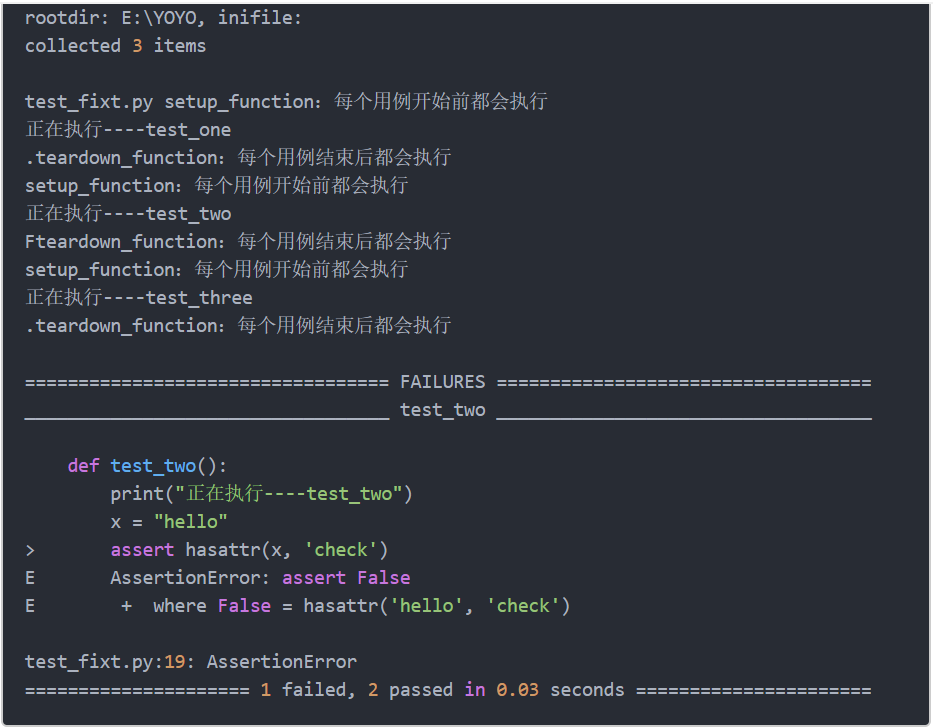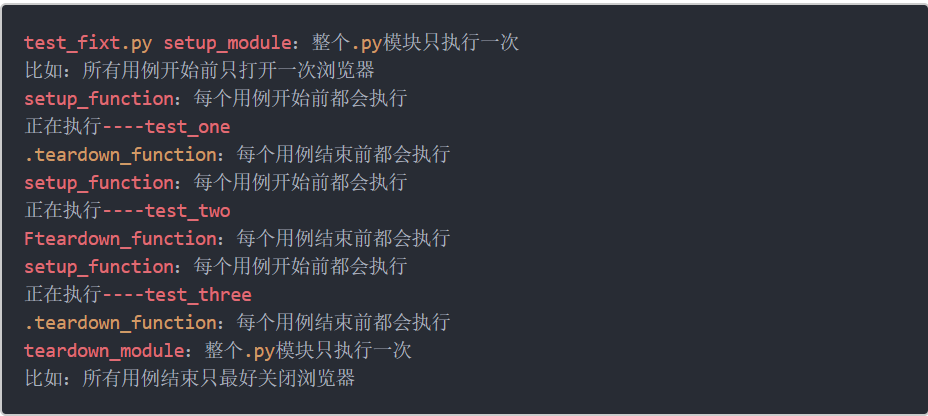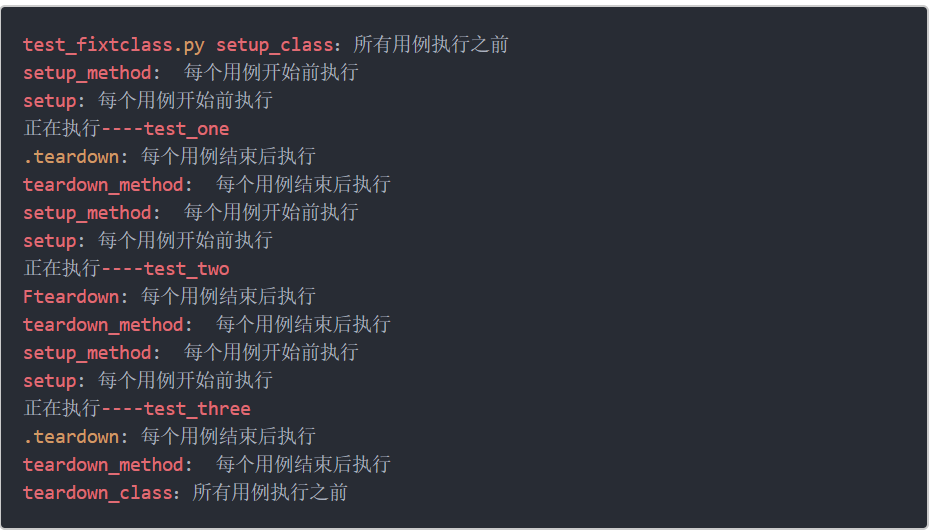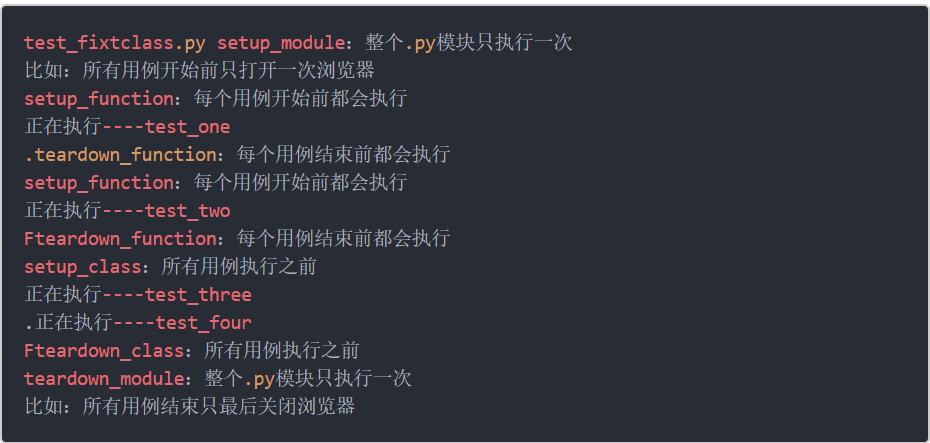1. 用例运行级别
-
模块级(setup_module/teardown_module)开始于模块始末,全局的
-
函数级(setup_function/teardown_function)只对函数用例生效(不在类中)
-
类级(setup_class/teardown_class)只在类中前后运行一次(在类中)
-
方法级(setup_method/teardown_method)开始于方法始末(在类中)
-
类里面的(setup/teardown)运行在调用方法的前后
2. 函数式
2.1 setup_function/teardown_function (每个用例开始和结束时调用一次)
# test_fixt.py # coding:utf-8 import pytest # 函数式 def setup_function(): print("setup_function:每个用例开始前都会执行") def teardown_function(): print("teardown_function:每个用例结束后都会执行") def test_one(): print("正在执行----test_one") x = "this" assert 'h' in x def test_two(): print("正在执行----test_two") x = "hello" assert hasattr(x, 'check') def test_three(): print("正在执行----test_three") a = "hello" b = "hello world" assert a in b if __name__ == "__main__": pytest.main(["-s", "test_fixt.py"])
运行结果

2.2 setup_module/teardown_module(所有用例开始和结束时调用一次)
# test_fixt.py # coding:utf-8 import pytest # 函数式 def setup_module(): print("setup_module:整个.py模块只执行一次") print("比如:所有用例开始前只打开一次浏览器") def teardown_module(): print("teardown_module:整个.py模块只执行一次") print("比如:所有用例结束只最后关闭浏览器") def setup_function(): print("setup_function:每个用例开始前都会执行") def teardown_function(): print("teardown_function:每个用例结束前都会执行") def test_one(): print("正在执行----test_one") x = "this" assert 'h' in x def test_two(): print("正在执行----test_two") x = "hello" assert hasattr(x, 'check') def test_three(): print("正在执行----test_three") a = "hello" b = "hello world" assert a in b if __name__ == "__main__": pytest.main(["-s", "test_fixt.py"])
运行结果

2.3 类和方法
1.setup/teardown和unittest里面的setup/teardown是一样的功能,setup_class和teardown_class等价于unittest里面的setupClass和teardownClass
import pytest # 类和方法 class TestCase(): def setup(self): print("setup: 每个用例开始前执行") def teardown(self): print("teardown: 每个用例结束后执行") def setup_class(self): print("setup_class:所有用例执行之前") def teardown_class(self): print("teardown_class:所有用例结束后执行") def setup_method(self): print("setup_method: 每个用例开始前执行") def teardown_method(self): print("teardown_method: 每个用例结束后执行") def test_one(self): print("正在执行----test_one") x = "this" assert 'h' in x def test_two(self): print("正在执行----test_two") x = "hello" assert hasattr(x, 'check') def test_three(self): print("正在执行----test_three") a = "hello" b = "hello world" assert a in b if __name__ == "__main__": pytest.main(["-s", "test_fixtclass.py"])
运行结果

备注:这里setup_method和teardown_method的功能和setup/teardown功能是一样的,一般二者用其中一个即可
2.4 函数和类混合
1.如果一个.py的文件里面既有函数用例又有类和方法用例,运行顺序又是怎样的呢?
# coding:utf-8 import pytest # 类和方法 def setup_module(): print("setup_module:整个.py模块只执行一次") print("比如:所有用例开始前只打开一次浏览器") def teardown_module(): print("teardown_module:整个.py模块只执行一次") print("比如:所有用例结束只最后关闭浏览器") def setup_function(): print("setup_function:每个用例开始前都会执行") def teardown_function(): print("teardown_function:每个用例结束前都会执行") def test_one(): print("正在执行----test_one") x = "this" assert 'h' in x def test_two(): print("正在执行----test_two") x = "hello" assert hasattr(x, 'check') class TestCase(): def setup_class(self): print("setup_class:所有用例执行之前") def teardown_class(self): print("teardown_class:所有用例执行之前") def test_three(self): print("正在执行----test_three") x = "this" assert 'h' in x def test_four(self): print("正在执行----test_four") x = "hello" assert hasattr(x, 'check') if __name__ == "__main__": pytest.main(["-s", "test_fixtclass.py"])
运行结果

2.从运行结果看出,setup_module/teardown_module的优先级是最大的,然后函数里面用到的setup_function/teardown_function与类里面的setup_class/teardown_class互不干涉